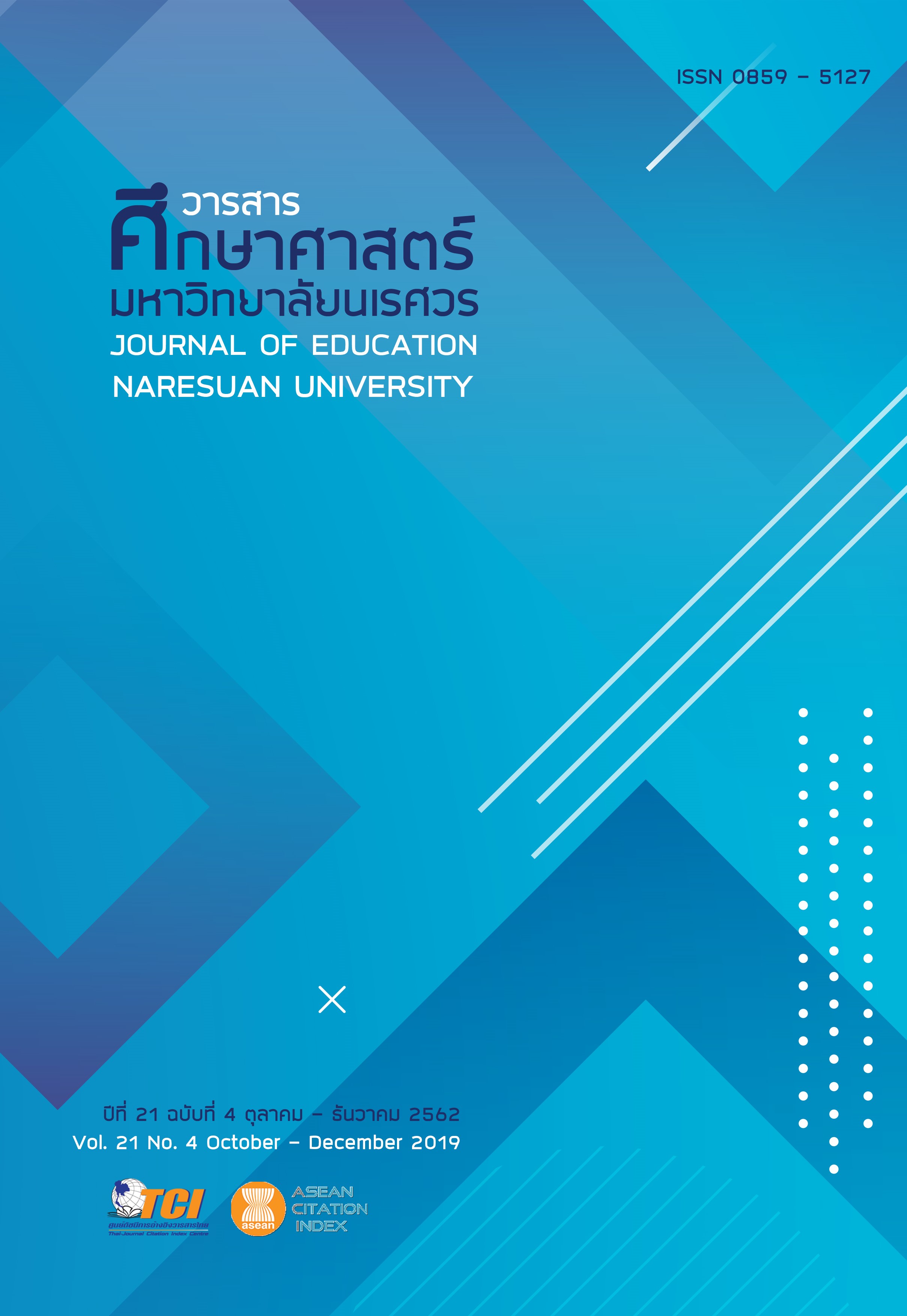การพัฒนารูปแบบการบริหารศูนย์การเรียนชุมชน สังกัดศูนย์การศึกษานอกระบบและการศึกษาตามอัธยาศัยอำเภอ (THE DEVELOPMENT OF ADMINISTRATIVE MODEL FOR THE COMMUNITY LEARNING CENTER UNDER DISTRICT NON-FORMAL AND INFORMAL EDUCATION CENTER)
Main Article Content
Abstract
การวิจัยครั้งนี้เป็นการวิจัยและพัฒนา มีวัตถุประสงค์หลัก เพื่อนำเสนอรูปแบบการบริหารศูนย์การเรียนชุมชนสังกัดศูนย์การศึกษานอกระบบและการศึกษาตามอัธยาศัยอำเภอ วิธีดำเนินการวิจัยแบ่งเป็น 3 ขั้นตอน คือ 1) การศึกษาความต้องการ และแนวทางการบริหารศูนย์การเรียนชุมชนสังกัดศูนย์การศึกษานอกระบบและการศึกษาตามอัธยาศัยอำเภอ โดยการวิเคราะห์และสังเคราะห์ เอกสารและงานวิจัยที่เกี่ยวข้อง เพื่อสร้างกรอบแนวคิดและสร้างเครื่องมือการวิจัย รวมทั้งการรวบรวมข้อมูลเกี่ยวกับสถานศึกษา ที่มีวิธีการปฏิบัติงานที่ดี จำนวน 3 แห่ง และ การสัมภาษณ์ผู้ทรงคุณวุฒิ จำนวน 6 คน 2) การสร้างและตรวจสอบรูปแบบการบริหารศูนย์การเรียนชุมชนสังกัดศูนย์การศึกษานอกระบบและการศึกษาตามอัธยาศัยอำเภอ ดำเนินการจากข้อมูลของขั้นตอนที่ 1 และตรวจสอบความเหมาะสมของรูปแบบฯด้วยการสนทนากลุ่มผู้ทรงคุณวุฒิ จำนวน 9 คน และ 3) การประเมินความเป็นประโยชน์ของรูปแบบการบริหารศูนย์การเรียนชุมชน โดยนำเสนอรูปแบบการบริหารศูนย์การเรียนชุมชนสังกัดศูนย์การศึกษานอกระบบและการศึกษาตามอัธยาศัยอำเภอและแบบสอบถามให้แก่ผู้อำนวยการศูนย์ 195 คน สถิติที่ใช้วิเคราะห์ข้อมูล ได้แก่ ค่าเฉลี่ยและส่วนเบี่ยงเบนมาตรฐาน ผลการวิจัย พบว่า รูปแบบการบริหารศูนย์การเรียนชุมชนสังกัดศูนย์การศึกษานอกระบบและการศึกษาตามอัธยาศัยอำเภอ มี 4 องค์ประกอบ ได้แก่ 1) หลักการและวัตถุประสงค์ศูนย์การเรียนชุมชน 2) คณะกรรมการศูนย์การเรียนชุมชน 3) ขอบข่ายภารกิจศูนย์การเรียนชุมชน และ 4) กระบวนการบริหารศูนย์การเรียนชุมชน ทั้งนี้ การประเมินรูปแบบการบริหารศูนย์การเรียนชุมชน สังกัดศูนย์การศึกษานอกระบบและการศึกษาตามอัธยาศัยอำเภอที่นำเสนอ มีความเป็นประโยชน์ในการนำไปปฏิบัติอยู่ในระดับมากที่สุด
THE DEVELOPMENT OF ADMINISTRATIVE MODEL FOR THE COMMUNITY LEARNING CENTER UNDER DISTRICT NON-FORMAL AND INFORMAL EDUCATION CENTER
This research, characterized as research and development, aimed to purpose a model for the community learning center under district non- formal and informal education center. The research consisted of 3 phases of procedures: Phase 1: analyzing and synthesizing the relevant documents and research findings of concept and the theories in administration including the study of 3 best practice institutions and interviewing of 6 experts in order to form a model, 2) drafting a tentative model, then validating the drafted model for its appropriateness through a focus group discussion of 9 experts, and 3) evaluating the usefulness of the model by 195 Non-formal and Informal education center directors through questionnaires. Data were analyzed, using means and standard deviations. The study revealed the following results; an administration model for the community learning center under district non-formal and informal education center consists of four components; 1) the principles and purposes of community learning center, 2) community learning center board, 3) the scope of tasks of a community learning center, and 4) the administrative processes of a community learning center. The evaluation of the model yielded the results at a highest level of usefulness.
Article Details
The owner of the article does not copy or violate any of its copyright. If any copyright infringement occurs or prosecution, in any case, the Editorial Board is not involved in all the rights to the owner of the article to be performed.
References
2. Chanpha, W. (2012). Participative administration model of basic educational committee in
the office of the basic education commission. Academic Journal of the College of Sangham, 4(1), 84 – 103. [in Thai]
3. Hiranmanimas, W. (2012). Development of the future organization of Thai technicians' organizations in schools under the office of vocational education commission (Doctoral dissertation). Phitsanulok: Naresuan University. [in Thai]
4. Homsuwan, C., Meejang, S., Jansila, V., & Pupat, P. (2013). The Development of Participatory Management Model for Colleges in the Vocational Education Commission. Journal of Education Naresuan University, 15(Special), 34 – 42. [in Thai]
5. Jitradub, S. (2012). Evaluation of non-formal education and education at the office of non-formal education non-formal education and informal education, 2008. Bangkok: Rangsi Printing. [in Thai]
6. Kaewmamee, S., MuangKaow, S., Jansila, V., Mejang, S., & Panichparinchai, T. (2017). A model of participatory management through governing board for promoting the efficiency of the primary educational service area office. Journal of Education Naresuan University, 19(1), 117 – 183. [in Thai]
7. Kiatsuranon, S., Chiwapimai, W., Boonruangrutana, S., & Ueawong, S. (2011). The development of participatory model of private sector in education management of Sisaket Province. Retrieved July 8, 2016, from https://resjournal.kku.ac.th [in Thai]
8. King Prahadhipok’s Institute. (2009). Thai constitutional parliament of the Kingdom of Thailand B.E. 2007 (6th ed.). Bangkok: King Prahadhipok’s Institute. [in Thai]
9. Ministry of Education. (2008). The Non-Formal and Informal Education Promotion Act B.E. 2008 (2nd ed.). Bangkok: Office of the Permanent Secretary, Ministry of Education. [in Thai]
10. Montriwatthana, N. (2010). Development of skill development center under the department of skill development (Doctoral dissertation). Phitsanulok: Naresuan University. [in Thai]
11. Nuchnueng, A., Kinawong, N., Mejang, S., & Jansila, V. (2008). Development of participative administration model for school development of basic school board member. Journal of Education Naresuan University, 10(Special), 1 – 16. [in Thai]
12. Office of the Basic Education Commission. (2010). National Education Act, B.E. 2542, Amendments (No. 2) B.E. 2545 and (No. 3) B.E. 2553. Bangkok: Prikwarn Graphic. [in Thai]
13. Office of the Education Council. (2013). Thai Education Situation in the World Stage 2013. Bangkok: Prikwan Graphic. [in Thai]
14. Phonyam, V., & Sathaphonwajana, S. (2014). Development of participation administration model of primary educational service area. EAU Heritage Journal, 4(1), 171 – 184. [in Thai]
15. Plianphan, R., Chanbanchong, C., Pakdeewong, P., & Konpuang, A. (2014). The administrative model of learning centers for stateless children on the border of Thailand-Myanmar. Journal of Education Naresuan University, 16(2), 104 – 118. [in Thai]
16. Srisa-ad, B. (2013). Preliminary research (9th ed.). Bangkok: Suweeriyasan. [in Thai]
17. Suwanpitak, S. (2013). Community Learning Center: A lifelong learning classroom near home. Bangkok: Office of Non-Formal and Informal Education. [in Thai]


